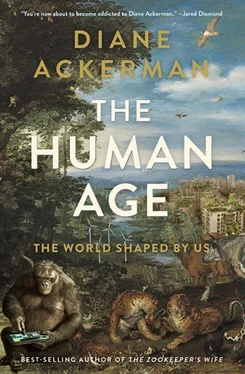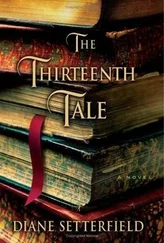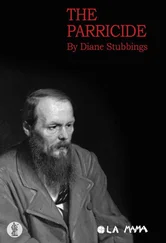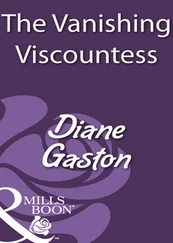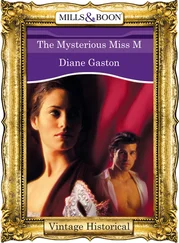Humans have always been hopped-up, restless, busy bodies. During the past 11,700 years, a mere blink of time since the glaciers retreated at the end of the last ice age, we invented the pearls of Agriculture, Writing, and Science. We traveled in all directions, followed the long hands of rivers, crossed snow kingdoms, scaled dizzying clefts and gorges, trekked to remote islands and the poles, plunged to ocean depths haunted by fish lit like luminarias and jellies with golden eyes. Under a worship of stars, we trimmed fires and strung lanterns all across the darkness. We framed Oz-like cities, voyaged off our home planet, and golfed on the moon. We dreamt up a wizardry of industrial and medical marvels. We may not have shuffled the continents, but we’ve erased and redrawn their outlines with cities, agriculture, and climate change. We’ve blocked and rerouted rivers, depositing thick sediments of new land. We’ve leveled forests, scraped and paved the earth. We’ve subdued 75 percent of the land surface—preserving some pockets as “wilderness,” denaturing vast tracts for our businesses and homes, and homogenizing a third of the world’s ice-free land through farming. We’ve lopped off the tops of mountains to dig craters and quarries for mining. It’s as if aliens appeared with megamallets and laser chisels and started resculpting every continent to better suit them. We’ve turned the landscape into another form of architecture; we’ve made the planet our sandbox.
When it comes to Earth’s life forms we’ve been especially busy. We and our domestic animals now make up 90 percent of all the mammal biomass on Earth; in the year 1000, we and our animals were only 2 percent. As for wild species, we’ve redistributed plants and animals to different parts of the world, daring them to evolve new habits, revise their bodies, or go extinct. They’ve done all three. In the process, we’re deciding what species will ultimately share the planet with us.
Even the clouds show our handiwork. Some are wind-smeared contrails left by globe-trotters in airplanes; others darken and spill as a result of factory grit loosed into the air. We’ve banded the crows, we’ve hybridized the trees, we’ve trussed the cliffs, we’ve dammed the rivers. We would supervise the sun if we could. We already harness its rays to power our whims, a feat the gods of ancient mythology would envy.
Like supreme beings, we now are present everywhere and in everything. We’ve colonized or left our fingerprints on every inch of the planet, from the ocean sediment to the exosphere, the outermost fringe of atmosphere where molecules escape into space, junk careens, and satellites orbit. Nearly all of the wonders we identify with modern life emerged in just the past two centuries, and over the past couple of decades, like a giant boulder racing ahead of a landslide, the human adventure has accelerated at an especially mind-bending pace.
Every day, we’re more at the helm, navigating from outer space to the inner terraces of body and brain. We are not the same apes flaking tools on the savanna, toting gemlike embers, and stringing a few words together like precious shells. It’s even hard to imagine our mental fantasia from that perspective. Did it feel more spacious or every bit as streamlike? We’re revising the planet and its life forms so fast and indelibly that the natural world from which we sprang—atoms to single cells to mammals to Homo sapiens to dominance—is far from the same wellspring our ancestors knew. Today, instead of adapting to the natural world in which we live, we’ve created a human environment in which we’ve embedded the natural world.
Our relationship with nature has changed… radically, irreversibly, but by no means all for the bad. How we now relate to the land, oceans, animals, and our own bodies is being influenced in all sorts of unexpected ways by myriad advances in manufacturing, medicine, and technology. Many of nature’s mysterious stuck doors have shivered open—human genome, stem cells, other Earth-like planets—widening our eyes. Along the way, our relationship with nature is evolving, rapidly but incrementally, and at times so subtly that we don’t perceive the sonic booms, literally or metaphorically. As we’re redefining our perception of the world surrounding us, and the world inside of us, we’re revising our fundamental ideas about exactly what it means to be human, and also what we deem “natural.” At every level, from wild animals to the microbes that homestead our flesh, from our evolving homes and cities to virtual zoos and webcams, humanity’s unique bond with nature has taken a new direction.
I began writing this book because I was puzzled by certain questions, such as: Why does the world seem to be racing under our feet? Why is this the first year that Canada geese didn’t migrate from many New England towns, and why have so many white storks stopped migrating in Europe? The world is being ravaged by record heat, drought, and floods—can we fix what we’ve done to the weather? What sort of stewards of the future planet will today’s digital children be? What will it mean to travel when we can go anywhere on our computers, with little cost or effort? With all the medical changes to the human body—including carbon blade legs, bionic fingers, silicon retinas, computer screens worn over one eye with the ability to text by blinking, bionic suits that make it possible to lift colossal weights, and a wonderland of brain enhancers to improve focus, memory, or mood—will adolescents still be asking, “Who am I?” or “ What am I?” How will cities, wild animals, and our own biology have changed in fifty years?
Without meaning to, we’ve created some planetary chaos that threatens our well-being. Yet despite the urgency of reining in climate change and devising safer ways to feed, fuel, and govern our civilization, I’m enormously hopeful. Our new age, for all its sins, is laced with invention. We’ve tripled our life span, reduced childhood mortality, and, for most people, improved the quality of life—from health to daily comforts—to a staggering degree. Our mistakes are legion, but our talent is immeasurable.
If we could travel back to, say, the Iron Age, few of us would go without packing certain essentials: matches, antibiotics, corrective lenses, compass, knife, shoes, vitamins, pencil and paper, toothbrush, fish hooks, metal pot, flashlight with solar batteries, and an array of other inventions that make life safer. We wouldn’t travel light.
As our spaceship enters the roulette wheel of a new solar system, hope starts building its fragile crystals once again. Disappointment has dogged our travels, but we are nomads with restless minds, and this sun resembles our own middle-aged star. Like ours, it rules a tidy jumble of planets looping in atypical orbits, some unfurling a pageant of seasons, others hard-hearted, monotone, and remote. They’re a strange assortment for siblings, with many small straggling hangers-on, but we’ve encountered odder night-fellows, and variety is their lure. One fizzy giant trails dozens of sycophantic moons; another floats inside a white cocoon. We weave between rocky, hard-boiled worlds, swing by a blimp tugging a retinue of jagged moons, dodge the diffuse rubble of asteroids, skirt a hothouse of acid clouds and phantom light.
Slowing to a hyperglide, we admire all the dappled colors, mammoth canyons of razor-backed rust, ice-spewing volcanoes, fountains fifty miles high, hydrocarbon lakes, scarlet welts and scourges, drooling oceans of frozen methane, light daggers, magma flows, sulfur rain, and many other intrigues of climate and geology. Yet there’s no sign of living, breathing life forms anywhere. We are such a lonely species. Maybe this solar system will be the harbor where we find others like ourselves, curious, questing beings of unknown ardor or bloom. Life will have whittled them to fit their world, it doesn’t matter how.
Читать дальше
